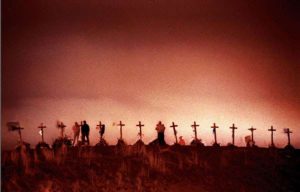 Guest Opinion By Timothy Coman (originally published in December of 1999)
Guest Opinion By Timothy Coman (originally published in December of 1999)
Tonight my heart hangs extremely heavy. I know the holidays are upon us, but this year has brought so much pain and agony for so many, I think we must sit and reflect. As I watched over and over the video clippings from Columbine, Jonesboro, Springfield and Pearl tragedies, I am reminded just where we have come to in our society.
So many people want answers, so many want justice, and yet, we should be looking at our own selves. We taught Dylan Klebold and Eric Harris to hate, yes, we did. We helped assassinate Cassie Bernall and Rachel Scott. By our actions, we allowed this to happen. No one single entity is to blame, we are all to blame.
Our children are medicated from the time they leave the hospital till often times before they leave high school. We all look for a quick fix, a fast solution, a McDonald’s drive-thru experience, often thinking or believing this is the answer, and yet we continue to be so blind.
We murder children in the name of convenience; we assassinate others’ character to gain power, wealth or strength, and morality is what you and I feel is right within our own eyes. Everyone wants to know about gun control, prayer in school, metal detectors or the newest idea which will save us all from whom?
Ourselves, that’s who.
It doesn’t matter who becomes president as long as he has the right charisma, a nice look, the right speech, the all-feel-good message that has lulled us to sleep, and while we slept, our children killed each other, and why? Because we have taught them so easily that it’s OK to kill—as long as you are justified in your beliefs. Preachers shout morality, and yet sin runs rampant in their own homes and places of worship.
The politician shouts gun control, and yet has no difficulty cheating on his or her mate as long as no one else gets hurt. Parents sacrifice their children for money, bigger homes, nicer lifestyles, when all their kids want is them.
How many times have both the Harrises and Klebolds asked; “Why didn’t we see something?” — Why didn’t we all see something? Why have we all been duped into believing it’s someone else’s fault, someone else’s responsibility. When will we take responsibility. Is it that hard or have forgotten how. Either way, we killed these children and many more like them by our apathy, and refusal to care.
It’s long past time, the hour is late. In a perfect utopia, people would get right, change their lives, love their kids, reach out and take their neighbor’s hand. Did we ever live in a “Leave it to Beaver” society, or has it always been this way? I ask you the question today; can we afford to murder any more of these children? Will our apathy allow another Columbine to exist? Do we really ever remember these people after a few years? Do we even care that people died in Oklahoma? Do the crowds still mourn at the site of the federal building, or is it just a passing moment?
I hope for each of us that Columbine burns deep in the hearts and minds of all of us forever. As Eric Harris was quoted as saying in one of the videos he made; “Our goal is to haunt everyone’s minds and thoughts of this terror.” And you know, my friend, I hope this tragedy is never forgotten. Let us never forget by our apathy, those young people we have murdered in America, land of the hated and home of the forgotten. Please think about this. I ask you today, would you have said yes like Cassie did?
###
Whether or not all the details of the Columbine shooting were correct when this was originally published is not the point. The question is, when? When will we care enough to take on the heart of the problem — social change?
The list of shootings grows longer as we recall the more recent and forget the past. It’s a problem.
It’s our problem because we have never been short on solutions; we haven’t cared enough to hear them.


